De Amerikaanse dichter en schrijver Robert Bly werd geboren op 23 december 1926 in Madison, Minnesota. Zie ook alle tags voor Robert Bly op dit blog.
The Buried Train
Tell me about the train that people say got buried
By the avalanche–was it snow?–It was
In Colorado, and no one saw it happen.
There was smoke from the engine curling up
Lightly through fir tops, and the engine sounds.
There were all those people reading–some
From Thoreau, some from Henry Ward Beecher.
And the engineer smoking and putting his head out.
I wonder when that happened. Was it after
High School, or was it the year we were two?
We entered this narrow place, and we heard the sound
Above us–the train couldn’t move fast enough.
It isn’t clear what happened next. Are you and I
Still sitting there in the train, waiting for the lights
To go on? Or did the real train get really buried;
So at night a ghost train comes out and keeps going…
SOLITUDE LATE AT NIGHT IN THE WOODS
I
The body is like a November birch facing the full moon
And reaching into the cold heavens.
In these trees there is no ambition, no sodden body, no leaves,
Nothing but bare trunks climbing like cold fire!
II
My last walk in the trees has come. At dawn
I must return to the trapped fields,
To the obedient earth.
The trees shall be reaching all the winter.
III
It is a joy to walk in the bare woods.
The moonlight is not broken by the heavy leaves.
The leaves are down, and touching the soaked earth,
Giving off the odor that partridges love.
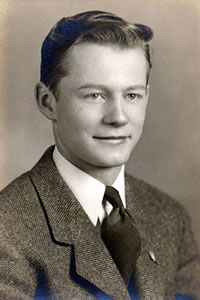
Robert Bly (Madison, 23 december 1926)
Een jonge Robert Bly
De Amerikaanse schrijver Norman Fitzroy Maclean werd geboren op 23 december 1902 in Clarinda, Iowa. Zie ook alle tags voor Norman Maclean op dit blog.
Uit: A River Runs Through It
“The four-and-a-half-ounce thing in silk wrappings that trembles with the underskin motions of the flesh becomes a stick without brains, refusing anything simple that is wanted of it. All that a rod has to do is lift the line, the leader, and the fly off the water, give them a good toss over the head, and then shoot them forward so they will land in the water without a splash in the following order: fly, transparent leader, and then the line—otherwise the fish will see the fly is a fake and be gone. Of course, there are special casts that anyone could predict would be difficult, and they require artistry—casts where the line can’t go over the fisherman’s head because cliffs or trees are immediately behind, sideways casts to get the fly under overhanging willows, and so on. But what’s remarkable about just a straight cast—just picking up a rod with a line on it and tossing the line across the river?
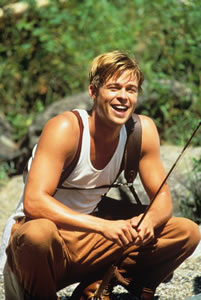
Scene uit de film van Robert Redford uit 1992 met o.a. Brad Pitt
Well, until man is redeemed he will always take a fly rod too far back, just as natural man always overswings with an ax or golf club and loses all his power somewhere in the air: only with a rod it’s worse, because the fly often comes so far back it gets caught behind in a bush or rock. When my father said it was an art that ended at two o’clock, he often added, “closer to ten than to two,” meaning that the rod should be taken back only slightly farther than overhead (straight overhead being twelve o’clock).”
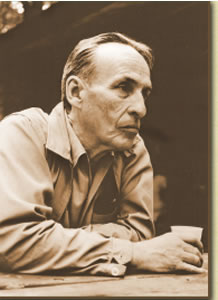
Norman Maclean (23 december 1902 – 2 augustus 1990)
De Franse dichter, schrijver en essayist Marcelin Pleynet werd geboren op 23 december 1933 in Lyon. Zie ook alle tags voor Marcelin Pleynet op dit blog.
Uit: Comme la poésie la peinture
„Apollinaire, qu’est-ce à dire ? Que savez-vous d’Apollinaire ?
Il m’a toujours semblé que les héritiers et les amis d’Apollinaire avaient réussi le « mauvais coup » dont Cézanne soupçonnait ceux qui prétendaient s’intéresser à sa peinture.
Je n’en veux pour preuve que les débats et tractations qui aboutissent à refuser, en 1924, puis en 1950, tous les projets de sculptures que Picasso proposa pour la tombe de son ami. C’est finalement un des artistes les plus médiocres du voisinage, un certain Serge Ferat, qui réalisera le monument. Pourquoi lui ? Quel rôle jouèrent effectivement Jacqueline Kolb (qu’Apollinaire épousa en mai 1918, sept mois avant de mourir) et les amis du poète dans cette mauvaise affaire ?
Apollinaire aujourd’hui. Quatre volumes et un « Album » dans la « Bibliothèque de la Pléiade », qui n’a toujours pas publié la correspondance et notamment les Lettres à Lou, d’où sont extraits les poèmes qui figurent dans le tome I des OEuvres complètes de la « Bibliothèque de la Pléiade », à partir d’une charcuterie poétique dont les éditeurs semblent ne s’être jamais demandé jusqu’à quel point elle dénaturait du tout au tout lesdits « Poèmes à Lou ». Pourquoi cette curieuse attitude vis-à-vis d’un poète dont on publie et commente par ailleurs la moindre notule journalistique ?“
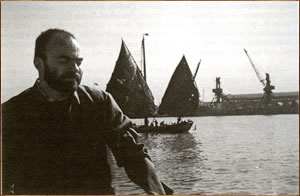
Marcelin Pleynet (Lyon, 23 december 1933)
In Shanghai, 1974
De Britse schrijver Tim Fountain werd geboren op 23 december 1967 in Dewsbury, West Yorkshire. Zie ook alle tags voor Tim Fountain op dit blog.
Uit: Icons: Quentin Crisp
„He offered us a drink and proceeded to pour me a vast brandy in a tall glass that was covered in grease; what looked like a fried egg proceeded to form on the top of the glass. He then sat alongside me on the bed, with Bette opposite in an armchair no more than two feet away (Bourne said we looked like “three men in a boat”) and proceeded to hold forth for two hours.
It was an utterly mesmerising and intoxicating performance, and made all the more fascinating for me because I hadn’t seen his one-man show An Evening With Quentin Crisp or read his books in enough detail to know that he was often quoting from them word for word, and that this was essentially his ‘greatest hits album’ performed live. Neither did I know that this was a performance he gave almost daily to the hundreds of strangers who phoned him up and offered to buy him lunch (he never removed his name from the phonebook, saying: “I am the most available man in America”).
He succeeded in making me believe this stuff was being said for the first time, for me.
He ranged over subjects as diverse as oral sex (“Marlene Dietrich said you have to let them put it in, otherwise they won’t come back”) and higher education (“a last wild effort on the part of the authorities to prevent an overdose of leisure driving the world mad”). More controversially, he asked me why President Bill Clinton was “sending the brave and the beautiful to fight in Yugoslavia” adding, “let them die, they’re only Europeans”.
And yet in the next breath he was telling me we must give our love to the underdog and the unloveable. It was a fantastically contradictory performance.“
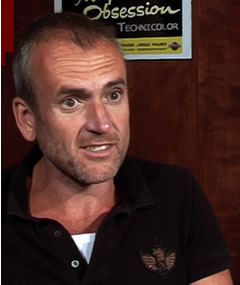
Tim Fountain (Dewsbury, 23 december 1967)
De Hongaarse schrijver Iván Mándy werd geboren op 23 december 1918 in Boedapest. Zie ook alle tags voor Iván Mándy op dit blog.
Uit: The Crossing (Vertaald door Eszter Molnár)
“Who said he was let out? Turned out.”
“All the more reason, then!”
“Why? Would you have kept him in?”
“The smell!”
“Smell? You call that a smell? Stink’s more like it. Stinker!”
“Someone should take that bottle away from him.”
“What for?”
The old man over by that tree! He’s watching me! How long has he been watching me?
A balcony high up. A woman on a tiny chair. Sunbathing. Suddenly leaning forward. Leaning over the railing.
The old man over by that tree! He’s watching me! How long has he been watching me? Blinking his eyes… winking. Yes, yes, positively winking. Any minute now and he’s going to wave. Does he know me from somewhere? No, impossible. Or is it?
And in fact the old man did seem to be nodding familiarly. He did not wave. Why should he? He closed his eyes. But only to look up again.
The woman drew back. Pressed back against the wall. Pressed close against the wall of the balcony. He came to see me. He’s going to come up. No, he hasn’t the strength to move. Can’t even stand. Hold it! Any minute now and he’ll be springing to his feet.
Then her mind went blank. She faded herself into the wall.
Down below the woman in the blue smock.
“We should phone.”
“Who do you have in mind?”
“What do you mean, who? Who do you think? An ambulance! Don’t you think we should phone for an ambulance?”
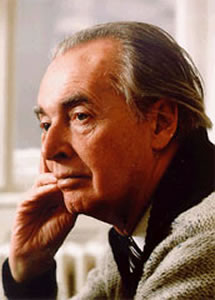
Iván Mándy (23 december 1918 – 26 oktober 1995)
Zie voor nog meer schrijvers van de 23e december ook mijn vorige blog van vandaag en eveneens mijn eerste blog van vandaag.
